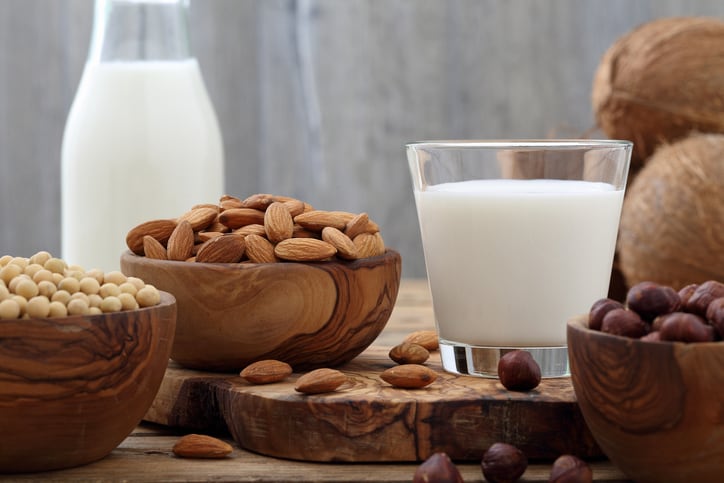The two probiotic-packed fermentation starter cultures, SoyFresh and CocoFresh, have been developed specifically for soy and coconut milk meaning manufacturers can connect two trends for plant protein and fermented foods.
According to Mintel data, the dairy category is by far the star of fermented food claims in Europe - but with the growing interest in plantmilks food manufacturers are interested in adding fermented claims to dairy alternatives too.
As well as bringing the health benefits associated with fermented foods – both cultures contain the trademarked Bifidobacterium BB-12 probiotic – the cultures change the flavour and, in the case of soy, the texture of the milk base.
The result is “healthy plant based products with the qualities we traditionally ascribe to dairy yoghurt," the firm said.
“Some characteristics are the same as yoghurt – there’s an acidic sharpness and a yoghurt-like flavour. With soy milk we also saw that the texture is different when we ferment it with Soyfresh. Instead of being drinkable it’s spoonable,” Lasse Vigel Joergensen, global marketing manager for fresh dairy at the Danish company told FoodNavigator.
According to Chr Hansen, the Bifidobacterium BB-12 probiotic strain is proven to support gastrointestinal health, although this has not been approved by European Food Safety Authority (EFSA) scientists so manufacturers cannot make this claim in Europe.
Firms should also be wary about using traditional dairy terms, which are protected under EU regulation 1308/2013.
The law does allow for a number of exceptions - 'coconut milk' is authorised but 'soy milk' is not - although the European Court of Justice recently ruled that purely plant-based products cannot, in principle, be marketed as ‘milk’, ‘cream’, ‘butter’, ‘cheese’ or ‘yoghurt’.
Joergensen doesn't believe these restrictions have much impact on market growth in Europe, however.
"Of course we follow these developments and we comply with what authorities say, but it's not very important to our business [...] and I don’t think it’s a big issue to the producers. They just have to work around it."
The cultures blend well with typical flavours, colours and additives used by manufacturers for yoghurts and dairy desserts.
“If the texture we develop is not enough they can also add stabilisers or texturisers. We tried with starches, gums and pectins that are normally used in the industry and it worked well,” said Joergensen.
In some cases, the cultures can also speed up the acidification process.
Double-digit growth
The Danish firm has been working on these cultures over the past year after spotting the opportunity to be first. “We work with innovation and we want to be first movers and innovators in the market, which is why we looked into this,” he said.
“This is still a very niche market – we estimate plant-based alternatives to be less than 1% of the fermented milk market – but it’s where we see growth. This will eventually be really significant.”
According to Innova Market Insights, global dairy alternative launches grew at a compound annual growth rate of 20% over the 2012-2016 period, while the global market for dairy alternative drinks alone is expected to reach US$16.3bn (€13.8bn) in 2018, more than double its 2010 value of US$7.4bn (€6.3bn).
The Danish firm predicts most demand will come from North America but also Western Europe where there is a “smaller but still interesting market”.
Ahead of this global launch, Chr Hanson worked with several development stage manufacturers "to ensure the products lived up to customer expectations" in North America, where the cultures are already on the market, and in France, Spain and Poland with the finished products should be on European supermarket shelves within the next six months.
Next step: Oat, pea….hemp and flax?

The next step, of course, will be to develop more cultures for other plant bases, such fermented pea protein or oats, which will most likely be on a case-by-case basis depending on individual demands from manufacturers, Joergensen said. “We are working on them but it’s early days.”
This ties in well with Innova’s predictions for an increasingly diverse market for plant-based dairy alternatives.
Director of innovation at Innova Lu Ann Williams said earlier this year: “We are starting to see an increasing variety of non-soy plant-based alternatives, including cereals such as rice, oats and barley, and nuts – such as almonds, hazelnuts and macadamias – as well as more unusual options such as hemp and flaxseed.”
Specific cultures for dairy-free cheese may also be on the cards.
Manufacturers of plant-based milks keen to experiment with yoghurts or dairy-like desserts will need to have fermentation equipment which they can either invest in themselves or use via a co-producer.
The cultures are sold frozen in small pellets and must be stored at -50 C where they have a shelf life of around one year.
In terms of volume, the company says it can supply “what is currently needed”.
